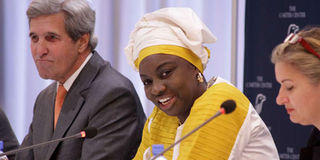2017 polls 'a major setback' for Kenyan democracy — Carter Centre

Carter Centre mission bosses John Kerry and Aminata Toure address the media at the Radisson Blu Hotel on August 10, 2017. The centre has praised IEBC and the Judiciary for their conduct during the polls. PHOTO | FILE | NATION MEDIA GROUP
What you need to know:
A few aspects of the electoral process meanwhile received positive assessments in the Centre's generally rueful report.
The Supreme Court “was well within its bounds” in the September 1 ruling that annulled the August 8 election, the Centre found.
It acknowledged, however, that as Jubilee had claimed, “there was no evidence demonstrating that the alleged irregularities were of a sufficient magnitude to affect the results.”
Last year's pair of presidential elections amounted to “a major setback in Kenya's democratic development,” the US-based Carter Centre has declared.
The election-monitoring organisation founded by former US President Jimmy Carter, in a report released on Wednesday, placed the blame for that outcome primarily on Kenya's top politicians.
HARM
“The key political leaders repeatedly took steps that harmed the process, taking hardline positions, failing to seek common ground, and using inflammatory and divisive political rhetoric,” the Carter Centre said in its 46-page final report on the 2017 Kenyan elections.
In its indictment of the country's political elite, the centre cited “harsh attacks by top political leaders on electoral and judicial authorities that seriously undermined the independence of the country’s democratic institutions and the rule of law.”
The report further excoriated the “confrontational tactics and actions of Kenya’s political leaders.”
Their irresponsible behaviour “polarised the country and exposed the deep tribal and ethnic rifts that have long characterised its politics,” the Carter Centre added.
The report did not specifically name Uhuru Kenyatta, Raila Odinga or any of their respective deputies in criticising the conduct of elections that “damaged Kenya’s key democratic institutions and its social cohesion.”
SUPREME COURT
A few aspects of the electoral process meanwhile received positive assessments in the Centre's generally rueful report.
The Supreme Court “was well within its bounds” in the September 1 ruling that annulled the August 8 election, the Centre found.
It acknowledged, however, that as Jubilee had claimed, “there was no evidence demonstrating that the alleged irregularities were of a sufficient magnitude to affect the results.”
But Kenyan law at the time of the court ruling did not require that alleged irregularities must be shown to have affected the results in order for an election to be annulled, the Center pointed out.
It said the court's ruling was adequately based on evidence of a lack of transparency and verification in transmitting vote tallies, as well as a failure by election authorities to respond to “legitimate concerns” raised in Nasa's petition challenging the August 8 outcome.
IEBC
But the Supreme Court found no evidence to support Nasa's claims of fraud and hacking related to the August 8 vote, the Centre added.
“Neither did the court find malfeasance on the part of staff of the IEBC,” it noted.
The biometric voter identification system developed by the Independent Electoral and Boundaries Commission “provided a strong safeguard against multiple voting on election day,” the report affirmed.
The IEBC is further lauded for its actions in the run-up to the re-vote ordered for October 26.
The election authority “took several steps to correct shortcomings identified in the court’s [September 1] ruling, including the introduction of more transparent and verifiable results tallying and transmission processes,” the Carter Center observed.
“Unfortunately, however, Kenya’s political leaders missed a critical opportunity to ensure an inclusive and transparent election,” the Center added.
NO TALKS
IEBC Chairman Wafula Chebukati had indicated, for example, that “the continued refusal of the two leading candidates to meet jointly with the IEBC to discuss an agreed-upon way forward constrained the IEBC’s ability to conduct a credible election,” the report said.
“The environment leading into the Oct 26 election was marked by increased insecurity, an uncertain political environment, and an opposition boycott that resulted in a largely uncontested election.”
The Carter Centre report includes a set of detailed recommendations to Parliament, the IEBC and Kenya's political parties intended to produce a more democratic and trustworthy election process.
Political leaders are urged, for example, to “demonstrate the courage and foresight to prioritise actions that foster genuine dialogue and reconciliation.”
These unnamed leaders should make concrete efforts to “advance Kenyans’ collective interest in inclusive governance, foregoing narrow and short-term partisan interests,” the report suggests.
It calls for prompt organising of “national stocktaking exercises” that would develop and implement electoral reforms well ahead of the 2022 elections.
KERRY
“The process should be guided by principles of inclusion and shared values grounded in the country’s constitution,” the Carter Centre advises.
The NGO deployed a team of experts and long-term observers in Kenya in April 2017 to monitor preparations for the election as well as the various campaigns.
Former US Secretary of State John Kerry and former Senegalese Prime Minister Aminata Touré led a short-term Carter Centre observation mission for the August 8 elections that included more than 100 observers from 34 countries in Africa and around the world.
Mr Kerry was roundly criticised for suggesting two days after the August 8 election that Raila Odinga should accept his apparent defeat and “move on.”
The Centre deployed a smaller observer team prior to the October 26 election. That mission was “limited in size and geographic scope and therefore did not attempt to provide a thorough assessment of the quality of the entire electoral process, nor a robust assessment of polling-station level processes on election day,” said the final report.





